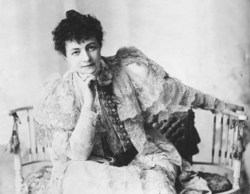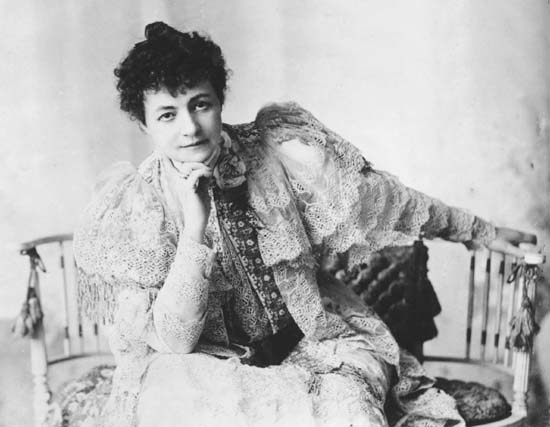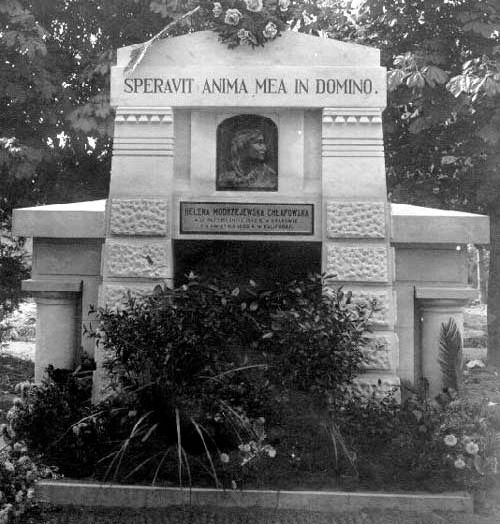Actress. She received stardom in the 19th century as a Polish-American actress with a repertory of Shakespeare and contemporary roles, some in both Polish and English. Born Jadwiga Benda, she was baptized Helen Opid, receiving her musician godfather's surname. She was the youngest child born into a family of a wealthy merchant, who died before her birth. She was educated at Saint John's Convent until she was fourteen years old. With Poland at war during her childhood, she remembered people protesting in the streets while women wearing mourning black. When she was 10 years old, her home burnt to the ground, and she met the nearly thirty-year-old actor, Gustav Zimajer, who used the stage name of Modrzejewska. Several of her half-brothers, who were actors, encouraged her to follow them in the theater. Knowing Modrzejewska since her childhood, she trusted him, married him about 1860, and he became her agent launching her career in 1861. Later, he managed the touring company. The couple had a son and daughter; in the spring of 1865, her daughter died. Years later, she learned that her first marriage was not legal as Modrzejewska was a bigamist. She performed in her hometown for four years before a twelve-year engagement in Warsaw, becoming the reigning diva at the Warsaw Imperial Theatre. Not only did she have a natural talent for acting, but she was beautiful especially wearing form-fitting gowns, which held the audience's attention. Her second marriage was on September 12, 1868 at St. Anna Church in Kraków to Count Karol Bozenta Chlapowski, who was the editor of a liberal nationalist newspaper, "Kra." For a short time, her husband had been imprisoned in Berlin for political reasons. Her home became a meeting place for politicians, artist, and writers, including 1905 Nobel Prize for Literature recipient, Henryk Sienkiewicz. During this period of history, Poland was under the control of the Russian Empire, which presented many difficulties. With political-based concerns, she had refused to perform in Russia, and eventually, she was banned in 1893 from performing in Russia. In 1870, she fell sick from typhus, but recovered. At one point, her first husband kidnapped their son and demanded a monetary ransom for his return. Emigrating in 1876 for personal and political reasons to the United States, she settled in California, where she and her husband, with little experience, attempted ranching, which proved to be a failure within a year. Many of their artistic friends, including Sienkiewicz, had joined with them emigrating to this region of California. Regardless of her poor control of the English language, she had to return to the stage. On August 20, 1877 she appeared in San Francisco in an English version of Cilea's four-act opera, "Adrienne Lecouvreur." Having much success with this performance, she was signed to a three-year contract and began with a tour of 15 northeastern cities including New York City. Using a feminized version of Modrzejewki, she changed her stage name to "Helena Modjeska." In 1881, she fulfilled her professional goal of having an English-speaking role on a Shakespearean stage in London, England. After a two-year stay in London, she returned to the United States, but still had a heavy Polish accent even after English diction lessons. In 1883 she, along with her husband and son, became American citizens. At the invitation of President Grover Cleveland's wife, she was a guest at the White House on February 24, 1886. From 1889 to 1890 she toured America with a talented but aging actor Edwin Booth. Her chief tragic roles were Shakespeare's Ophelia, Juliet, Desdamona, and Queen Anne in "Richard III;" Friedrich Shiller's Princess Eboli; Victor Hugo's Tisbe; and Juliusz Slowacki's Mazeppa. In comedy her favorite roles included Beatrice in "Much Ado About Nothing." When not acting, she spent summers in the Santa Ana Mountains in southern California at her residence, which was given the title "Arden." In 1897 she had a stroke but recovered within a year, thus continuing to act for several years. For a final stage performance in Poland, she returned the fall of 1902 for six months. On May 2, 1905 she had her jubilee performance in New York City, yet continued touring for two more years. Upon retirement she had made 26 American tours with 4,400 performances in 34 roles in 15 Shakespearean plays. After dying from Bright's Disease, her body, at her wish, was repatriated to Poland to be buried next to her mother in the family plot. Posthumously in 1910, her autobiography "Memories and Impressions" was published in English and later in Polish in 1957. Her autobiography goes into the details of her personal life and the entire book can be found online. The University of California Irvine has archived her professional papers, which many are written in Polish, and several items of clothing. "Starring Madame Modjeska: On Tour in Poland and America" is a 2011 biography by Beth Homgreabout.
Actress. She received stardom in the 19th century as a Polish-American actress with a repertory of Shakespeare and contemporary roles, some in both Polish and English. Born Jadwiga Benda, she was baptized Helen Opid, receiving her musician godfather's surname. She was the youngest child born into a family of a wealthy merchant, who died before her birth. She was educated at Saint John's Convent until she was fourteen years old. With Poland at war during her childhood, she remembered people protesting in the streets while women wearing mourning black. When she was 10 years old, her home burnt to the ground, and she met the nearly thirty-year-old actor, Gustav Zimajer, who used the stage name of Modrzejewska. Several of her half-brothers, who were actors, encouraged her to follow them in the theater. Knowing Modrzejewska since her childhood, she trusted him, married him about 1860, and he became her agent launching her career in 1861. Later, he managed the touring company. The couple had a son and daughter; in the spring of 1865, her daughter died. Years later, she learned that her first marriage was not legal as Modrzejewska was a bigamist. She performed in her hometown for four years before a twelve-year engagement in Warsaw, becoming the reigning diva at the Warsaw Imperial Theatre. Not only did she have a natural talent for acting, but she was beautiful especially wearing form-fitting gowns, which held the audience's attention. Her second marriage was on September 12, 1868 at St. Anna Church in Kraków to Count Karol Bozenta Chlapowski, who was the editor of a liberal nationalist newspaper, "Kra." For a short time, her husband had been imprisoned in Berlin for political reasons. Her home became a meeting place for politicians, artist, and writers, including 1905 Nobel Prize for Literature recipient, Henryk Sienkiewicz. During this period of history, Poland was under the control of the Russian Empire, which presented many difficulties. With political-based concerns, she had refused to perform in Russia, and eventually, she was banned in 1893 from performing in Russia. In 1870, she fell sick from typhus, but recovered. At one point, her first husband kidnapped their son and demanded a monetary ransom for his return. Emigrating in 1876 for personal and political reasons to the United States, she settled in California, where she and her husband, with little experience, attempted ranching, which proved to be a failure within a year. Many of their artistic friends, including Sienkiewicz, had joined with them emigrating to this region of California. Regardless of her poor control of the English language, she had to return to the stage. On August 20, 1877 she appeared in San Francisco in an English version of Cilea's four-act opera, "Adrienne Lecouvreur." Having much success with this performance, she was signed to a three-year contract and began with a tour of 15 northeastern cities including New York City. Using a feminized version of Modrzejewki, she changed her stage name to "Helena Modjeska." In 1881, she fulfilled her professional goal of having an English-speaking role on a Shakespearean stage in London, England. After a two-year stay in London, she returned to the United States, but still had a heavy Polish accent even after English diction lessons. In 1883 she, along with her husband and son, became American citizens. At the invitation of President Grover Cleveland's wife, she was a guest at the White House on February 24, 1886. From 1889 to 1890 she toured America with a talented but aging actor Edwin Booth. Her chief tragic roles were Shakespeare's Ophelia, Juliet, Desdamona, and Queen Anne in "Richard III;" Friedrich Shiller's Princess Eboli; Victor Hugo's Tisbe; and Juliusz Slowacki's Mazeppa. In comedy her favorite roles included Beatrice in "Much Ado About Nothing." When not acting, she spent summers in the Santa Ana Mountains in southern California at her residence, which was given the title "Arden." In 1897 she had a stroke but recovered within a year, thus continuing to act for several years. For a final stage performance in Poland, she returned the fall of 1902 for six months. On May 2, 1905 she had her jubilee performance in New York City, yet continued touring for two more years. Upon retirement she had made 26 American tours with 4,400 performances in 34 roles in 15 Shakespearean plays. After dying from Bright's Disease, her body, at her wish, was repatriated to Poland to be buried next to her mother in the family plot. Posthumously in 1910, her autobiography "Memories and Impressions" was published in English and later in Polish in 1957. Her autobiography goes into the details of her personal life and the entire book can be found online. The University of California Irvine has archived her professional papers, which many are written in Polish, and several items of clothing. "Starring Madame Modjeska: On Tour in Poland and America" is a 2011 biography by Beth Homgreabout.
Bio by: Linda Davis
Family Members
Advertisement
See more Modjeska memorials in:
Records on Ancestry
Advertisement







